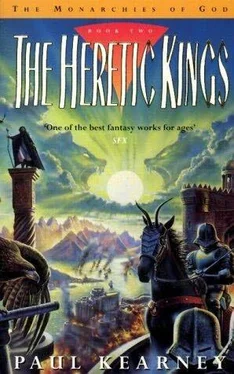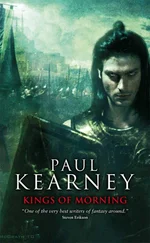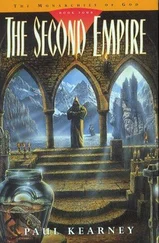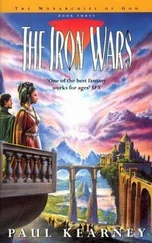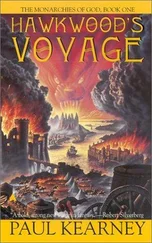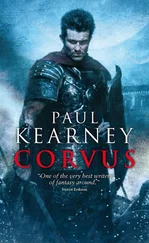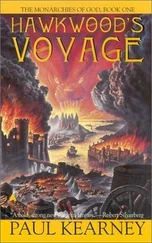Paul Kearney - The Heretic Kings
Здесь есть возможность читать онлайн «Paul Kearney - The Heretic Kings» весь текст электронной книги совершенно бесплатно (целиком полную версию без сокращений). В некоторых случаях можно слушать аудио, скачать через торрент в формате fb2 и присутствует краткое содержание. Жанр: Фэнтези, на английском языке. Описание произведения, (предисловие) а так же отзывы посетителей доступны на портале библиотеки ЛибКат.
- Название:The Heretic Kings
- Автор:
- Жанр:
- Год:неизвестен
- ISBN:нет данных
- Рейтинг книги:3 / 5. Голосов: 1
-
Избранное:Добавить в избранное
- Отзывы:
-
Ваша оценка:
- 60
- 1
- 2
- 3
- 4
- 5
The Heretic Kings: краткое содержание, описание и аннотация
Предлагаем к чтению аннотацию, описание, краткое содержание или предисловие (зависит от того, что написал сам автор книги «The Heretic Kings»). Если вы не нашли необходимую информацию о книге — напишите в комментариях, мы постараемся отыскать её.
The Heretic Kings — читать онлайн бесплатно полную книгу (весь текст) целиком
Ниже представлен текст книги, разбитый по страницам. Система сохранения места последней прочитанной страницы, позволяет с удобством читать онлайн бесплатно книгу «The Heretic Kings», без необходимости каждый раз заново искать на чём Вы остановились. Поставьте закладку, и сможете в любой момент перейти на страницу, на которой закончили чтение.
Интервал:
Закладка:
The Providence ’s guns were roaring, softening up the waterfront where the marines and soldiers of the squadron would make their landing. On the formation’s vessels the fighting men stood in unbroken ranks amidships, their lips moving in prayer, their hands checking armour and weapons one last time. Three thousand men to carry the eastern half of Abrusio and hack a way up to the palace. They seemed pitifully few to Abeleyn, but he had to remind himself that the fleet was doing its part in the Great Harbour, and Mercado’s men would be assaulting across the burnt wasteland of the western city also. With luck, his own forces should not have too many of the enemy to contend with.
He could see the sea walls of eastern Abrusio now, scarcely three cables away. The water was deep here, seven fathoms at least, and even the carracks would be able to run in close to the walls to support the landing parties with point-blank fire.
The longboats and cutters of the squadron were already on the booms, and sailors and marines were hauling together in sweating crowds to swing them out over the ship’s sides and down to the water so far below. All this while the guns bellowed out broadside after broadside and were answered by the wall batteries. Abeleyn had to hold himself upright, unflinching, as rounds began to whistle and crash home on the carrack. A longboat took a direct hit and exploded in a spray of jagged wood and gore, men flung in all directions, ropes flapping free. But the work went on, and the small boats were lowered down the sides of the ships one by one. There were scores of them, enough to carry over a thousand men in the first wave.
“Your boat is ready, sire,” Admiral Rovero shouted over the noise, his lopsided mouth seemingly built to concentrate the force of his voice. Abeleyn nodded. He felt a touch of warmth as Sergeant Orsini fell into step beside him, and took a moment to grip the man’s shoulder. Then he put one leg over the bulwarks and began climbing down the rope ladder hanging there while a yard away on the other side of him the culverins exploded and were reloaded, running in and out like monsters let loose and then restrained.
He was in the boat, his heart almost as loud as the gunfire in his head. The vessel was already packed with men, struggling with oars and arquebuses and swords and ladders. Abeleyn stepped over them to the prow, where the laddermen were squatting ready. He waved his hand at the helmsman, and they cast off from the looming carrack along with half a dozen other crowded boats. The men’s oars dipped, and they began to move over the shot-stitched water.
An agonizing time of simply sitting there while they crawled forward towards the walls. There were scores of boats in the water, a mass of close-packed humanity crammed into them, dotting the deadly space between the hulls of the warships and the sea walls of the city. But they took few casualties in that choppy approach. The broadsides of the carracks were smothering the wall batteries with fire like mother hens protecting their chicks. Abeleyn felt that if he stuck up a hand into the air he could catch a cannonball, so thick was the volume of shot screaming overhead. To his own alarm, he had a momentary urge to throw up. Several of the men in the boat had already done so. It was the waiting, the drawing tight of the nerves to unbearable tautness. Abeleyn swallowed a mouthful of vomit that was searing his throat. Kings could not afford to show such weaknesses.
They were at the wall, the boat’s bow bumping against the weathered stone. Showers of rock were falling down on them as the shells from the carracks ploughed into the defences above their heads. The naval gunners would elevate their fire at the last moment, giving their comrades as much cover as possible in that murderous time of grappling with the ungainly ladders.
The laddermen stood up with their bulky charge-a fifteen-foot ladder with hooks of steel at its top which were clanging against the stone. They swayed and lurched, their legs held steady by their comrades, until finally the ladder had hooked on to an embrasure above.
Abeleyn pushed them out of the way and climbed first. Golophin and Mercado would have railed at him for such foolishness, but he felt there was nothing else to do. The King must be seen to take the lead. If these men showed their willingness to die for him, then he too must illustrate it in return.
So intent, so utterly concentrated were his thoughts, that he did not even pause to wonder if any of the men would follow him. The spectre of his death was something which hovered gleefully, cackling at his shoulder. His feet were leaden in their boots. He pictured his precious body torn asunder, riddled with bullets, tossed down into the bloody water below. His life ended, his vision of the world, unique and unrecoverable, made extinct. The strain was so great that for a second the wall in front of his nose seemed to turn slightly red, echoing the thunder of blood through his booming arteries.
He drew his sword, awkward and heavy in his armour, and climbed one-handed, gulping for air that would not be sucked into his lungs fast enough.
A stone clanged off one shoulder, and he almost fell. Looking up, he saw a wild-eyed Knight Militant looking over the battlements at him. He froze, utterly helpless as he stared into the man’s raging countenance. But then the Knight’s face disintegrated as a volley of arquebus fire from the boat below hammered into him, throwing him back out of sight. Abeleyn climbed on.
He was at the top, on the walls. Men running, dismounted guns, rubble, gaping holes in the defences. Shot from the carracks whistling higher as the guns were elevated.
Someone running towards him. His own sword flicking out before he even thought of it, clashing aside the other man’s blade. A boot to the midriff, and the man was gone, screaming off over the catwalk.
More of his own men behind him. They were clearing a stretch of wall, fighting the knots of the enemy who were rushing towards them, pushing them back. It was only then that Abeleyn realized how lightly the walls were defended.
I’m alive, he thought with keen surprise. I’m still here. We are doing this thing.
Something in him changed. Until now he had been so preoccupied by what he had to do, by the possibility of his own death or maiming, that he had been thinking like a private soldier obsessed with the precariousness of his own existence. But he was the King. These men were looking to him for orders. He had the responsibility.
He remembered the seaborne fight aboard Dietl’s carrack, a hundred years ago it seemed. He remembered the delight in battle, the sheer excitement of it, and his own feeling of invincibility. And he realized in a tiny, flashing instant, that he would never feel that way again, not about this. That feeling had something to do with youth and exuberance and the joy at being alive. But he had seen his city burned to ashes. He had a child growing in a woman’s belly. His crown had cost his people thousands of lives. He would never feel so untrammelled and unafraid again.
“Follow me!” he shouted to his men. The enemy were falling back off the walls as hundreds more of the landing forces struggled atop the battlements. He led his troops off the sea defences of Abrusio into the streets of the city itself and the bloody work which yet awaited them.
Golophin stared at the awesome spectacle. A city in torment, burned, bombarded and broken down. Perhaps in the east, with the fall of Aekir and the battles at Ormann Dyke, they could match this scale of destruction and carnage, but nothing he had ever seen before in his long life had prepared him for it.
He had seen the King’s squadron assault the eastern sea walls as the main body of the fleet attacked the mole forts and the boom which protected Abrusio’s widest harbour. But now he could see nothing, not even with his cantrips, for the entire enclosed trio of bays which formed the seaward side of the city was obscured by thundering smoke clouds. Three miles of shell-torn water from which a steady roar issued, as though some titanic, agonizing labour of birth were going on deep in that fog of war.
Читать дальшеИнтервал:
Закладка:
Похожие книги на «The Heretic Kings»
Представляем Вашему вниманию похожие книги на «The Heretic Kings» списком для выбора. Мы отобрали схожую по названию и смыслу литературу в надежде предоставить читателям больше вариантов отыскать новые, интересные, ещё непрочитанные произведения.
Обсуждение, отзывы о книге «The Heretic Kings» и просто собственные мнения читателей. Оставьте ваши комментарии, напишите, что Вы думаете о произведении, его смысле или главных героях. Укажите что конкретно понравилось, а что нет, и почему Вы так считаете.
